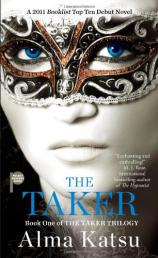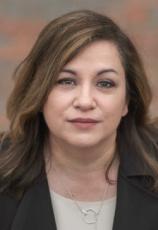Author Talk: September 29, 2011
THE TAKER, Alma Katsu’s debut novel, begins with Lanny, an immortal woman who arrives at a hospital in Maine in the middle of a cold night and confesses to a murder. Inspired in part by Katsu’s upbringing in “ancient houses that creaked with every passing breeze,” Lanny’s complex saga gradually unfolds, telling of a world where magic, reality and timeless love converge. In this interview, Katsu discusses her childhood fascination with “the spooky and supernatural,” and ties the atmospheric components of the story to her unique ideas about the coexistence of science, religion and human experience. She also describes the process of simultaneously writing in multiple voices, tenses and time periods, and gives several tantalizing glimpses into the two upcoming sequels.
Question: Where did you find the inspiration for THE TAKER? In its own way, THE TAKER is an alchemy of genres --- mixing romance, the paranormal, colonial drama, with a touch of post-modernism. Did you draw from many sources for the book?
Alma Katsu: It wasn't until after I'd written THE TAKER that I realized it combined many influences on my life. I never thought I was that big a fan of the American Colonial period, but when you grow up near Concord, Massachusetts you're steeped in it. For instance, I think it might actually be a law that schoolchildren must watch the movie Johnny Tremain every year until high school. I think the paranormal influence goes back to childhood, too. Maybe it was that we lived in ancient houses that creaked with every passing breeze or the fact that there were five cemeteries in my tiny hometown (two funeral homes within a block from my home!), but as a child I seemed predisposed to believe in the spooky and supernatural. And of course, that's what children do, indulge in magical thinking as a way of coping with their inherent powerlessness.
Q: Science, religion, and magic seem to be at odds throughout the story, with Lanny's transformation never fully explained or understood. Was this your intention? Where do you stand on the confluence of science, magic, and faith?
AK: That Lanny's changed circumstances are not fully explained is intentional, although it is revealed in the third book. Hopefully, readers will be surprised and delighted by what is revealed. Also, though, the mystery was meant to mirror what we experience in real life: We think we know the answer to a question, but it later turns out that we don't. At one time we believed the Earth was the center of the cosmos, with all the heavenly bodies revolving around it. It was touted as a fact (a matter of science, to stretch a point) but was also part of theologians' explanation of God's universe, so it was a matter of religion, too. So when this was disproved, did it mean religion was "wrong"? Is "bad" religion nothing more than superstition, or magic? Magic, faith, and science seem to me to be part of a continuum of understanding --- different ways of looking at the same thing. And you can be blindly faithful to your point of view from any of these three perspectives.
Q: You grew up in a small town in Massachusetts, near the historic town of Concord. How did your background play a role in writing THE TAKER?
AK: I find things from my childhood, small and large, have crept in throughout THE TAKER. The crypt in which Sophia's body is stored is taken from one of the five cemeteries in my hometown, a strange vault covered with sod and grass, with padlocked iron gates barring the doors. (How could you not, as a child, think those gates were there to keep the dead from getting out at night?) The description of the attic space in which Uzra hides from Adair is a ringer for the unfinished attic in my childhood home. There was not, however, a boy like Jonathan for whom all the girls pined.
Q: What would you hope to accomplish with an endless eternity of life?
AK: I'm in the camp that would not wish for eternity, I'm afraid. It is the knowledge that we will die that defines our lives. That's why Lanny and the others are at a loss. They don't know what to make of life, and partly because they're ne'er-do-wells, it doesn't occur to them to apply themselves to something useful. Jonathan figures this out, redeems himself, and because of this, Lanny can't refuse him his wish.
Q: Do you believe that Lanny has a soul mate? Is Luke her chance for redemption, or just another bump in a very, very long road?
AK: Life is a mystery to Lanny, as it is for many of us when we're young. We want to grow up, we're in a hurry to grow up, but we're not really sure what that means. We have our parents' examples, the example of some of our friends or siblings, but what if none of them are satisfactory? What if you want more out of life but not only are you not sure how to get it, you're not even sure what it is you want, exactly? What she wanted was experience, and she got more than she expected. She makes bad choices, but let's not fool ourselves: Many people make bad choices in their youth. They divorce, remarry, change career fields, move to a new continent --- or do none of these things, and remain in a state of desperation. No one is born with the answers and we have only this one life to find fulfillment, or happiness.
Oh dear, I really got on a soapbox there. To address the part about Luke, that very question is answered in book two. It is Lanny's dilemma, a major test on her way to becoming a thoughtful, caring person deserving of being truly, completely loved.
Q: How did you handle writing the different perspectives and time periods? Did you create them individually, or weave in and out of telling each story as the book is presented?
AK: The book underwent many revisions, but from the very beginning it had the present day story threaded through what is essentially Lanny's life story. The story-within-a-story --- Adair telling his tale --- came afterwards. I had originally pictured an entire book devoted to Adair, so that big chunk was carved out of that book. All those difficult structural elements --- the shifts in time, POV, even verb tense --- are what made writing the book so challenging. It's sort of a case study of what not to do when writing your first novel.
Q: The immortals of Adair's court are all deeply flawed in their own way. Is there something to be said about the type of people that are given such magical gifts? Were you at all tempted to tell a story about incredibly decent and altruistic immortals? Is that what Jonathan ultimately represents to you, especially with his dedication to his tribes as a bush doctor?
AK: You're coming close to the answer to the mystery, which is explained at the end of the series. Redemption is at the heart of the story. We all make mistakes in youth, behave foolishly, selfishly, do things we regret deeply as adults, so in that way, I think the story will resonate (to a degree) with most people.
I see the "magical gifts" a bit differently. The gift these flawed people are given is immortality, but it must be spent in servitude to Adair, with his hellish disposition. He is their jailer, and they have little hope of pardon. It is a kind of inescapable hell on earth. They have no choice but to accept it.
Q: The long arc of time established in the story, and the hints of Adair's released minions speak to an entire world and slew of characters that we have yet to meet. Do you have plans to continue to tell stories in this established world, possibly as a series?
AK: Absolutely. Readers will meet new minions from Adair's past in the next book, tentatively titled The Reckoning. You'll see them contrasted with the ones you know, Tilde, Alejandro, Dona, and struggle with this question of redemption. Some of them will earn redemption at great personal cost.
Q: Who do you see yourself in the most? Lanny, Luke, or Adair?
AK: I didn't think so but writing is a journey of self-discovery, as cliché as that might sound. Your characters behave a certain way and you, the author, struggle to understand why, and in the process of figuring it out you come to see it's a recurring problem in your own life, one you haven't solved. I came to see parts of myself in Lanny. In understanding Jonathan, I realized that he was drawn from maddeningly aloof and emotionally detached men I have known. I think most women have known a Jonathan or two in their lives!
Q: Who are your literary influences?
AK: I have so many it will sound a bit crowded. What comes through most strongly to me, in this book, is THE SCARLET LETTER by Nathaniel Hawthorne and FANNY HILL by John Cleland. As you noted, there's probably the influence of the post-modernists in there, too, as I was mad for them for a spell, most notably John Barth, Vladimir Nabokov. I think THE TAKER owes a lot to fairy tales, too. It puts the reader in the funny spot, where on one hand, you're close to stories from childhood—there's magical thinking, and the bloody-mindedness of old fairy tales. One interesting thing about fairy tales is that the morality of an individual's behavior is clear-cut enough so that children are comfortable with their judgments: It's fairly easy to tell who is right and who is wrong. I think in THE TAKER, there are some characters about whom you can make these distinctions easily, but with others --- Lanny in particular --- the story is a bit more complicated. The story is about redemption, but the whole question of what is a transgression is left up to the reader.
Q: Are you working on another novel? If so, will it be in the same style as THE TAKER, mixing romantic realism and fantastic supernaturalism?
AK: I couldn't stop thinking about the characters in THE TAKER, and luckily Gallery Books is fairly smitten with them, too, so I get to continue their story in the next two books. If all goes to plan, the next book will be slightly different from THE TAKER in that it's a bit more plot-driven, and the third book is different again in that it's more fantastical. Hopefully the trio will make for an enjoyable story that never gets stale and always takes the reader to new places.
THE TAKER © Copyright 2011 by Alma Katsu. Reprinted with permission by Gallery Books. All rights reserved.









